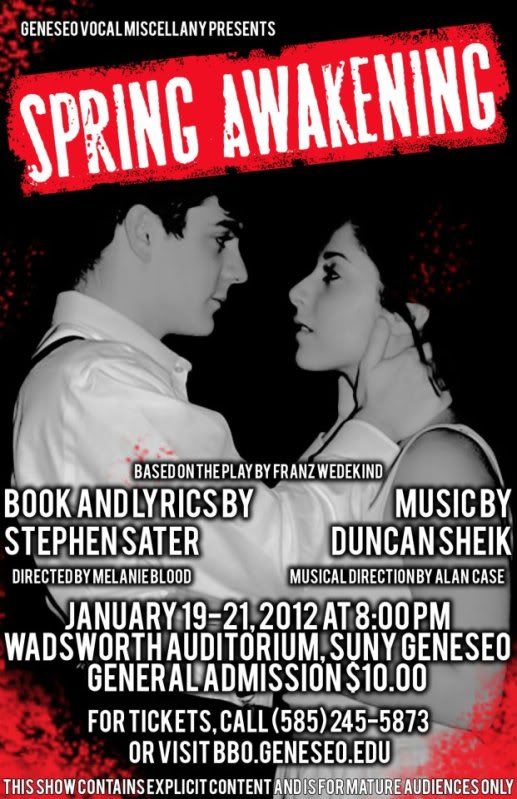
(Poster design by Philip Romano)
Vocal Miscellany’s production of Duncan Sheik and Steven Sater’s Spring Awakening is in many ways an homage to the original Broadway production, but far from mere imitation. With a show so beloved by the current student generation, director Dr. Melanie Blood and her cast have put together a performance that pays respect to what we loved about the original show while maintaining a distinct sense of individuality.
Based on the 1890 play by Frank Wedekind, Spring Awakening is a rock musical which tells the story of a group of teenagers in late 19th Century Germany struggling to reconcile their growing sexual urges with the repressive nature of their society.
We are first introduced to Wendla, a curious 14-year-old girl, played by junior Alexandra Mendes. With a role often burdened by the shadow of Lea Michele’s original interpretation, Mendes succeeds at making Wendla entirely her own, carrying her sexual ignorance with weary bitterness. This is not the wide-eyed innocent who believes in the stork, this is a young woman who knows she is being lied to and is tired of it.
Her answer arrives in Melchior Gabor, a rebellious classmate who is far more worldly than most kids their age. Sophomore Luke Martin plays Melchior not just as a young man eager to explore the world, but even more so, one who is overwhelmingly saddened that his friends refuse to embrace enlightenment. This choice lends a level of disillusionment to the character that matches Mendes’ Wendla well. Together they are a pair searching in each other for some semblance of hope which cannot be found.
The voice of this hopeless youth is embodied in junior Josh Horowitz’s sensitive portrayal of Moritz Stiefel, Melchior’s best friend, who feels the pressures to succeed more than any other character, ultimately buckling underneath them. Horowitz gives Moritz a tender vulnerability, making his suicide in Act II all the more heartbreaking as the victim of society’s unrealistic expectations.
Also of note are junior Julia Masotti and sophomore Elyssa Ramirez as Martha and Ilse (respectively), two of Wendla’s close friends who are physically and sexually abused by their fathers. In “The Dark I Know Well,” the two young women wail in release of their pent-up anger, letting the audience understand every inch of the pain they have suffered in silence.
Seniors Lauren Scheibly and Brandon DeFilipis achieve the formidable task of portraying all the adult characters, distinguishing their multiple identities while adapting to rapidly changing emotional contexts. In one moment they are grieving parents, the next they are hilarious caricatures of a smarmy headmaster and headmistress.
Overall, SUNY Geneseo has made its mark as one of the first colleges to perform this musical since the close of its Broadway and touring runs. While it certainly has its nods to the original production, it does, without question, make a unique and individual statement thanks to its enormously talented ensemble of actors and designers.
